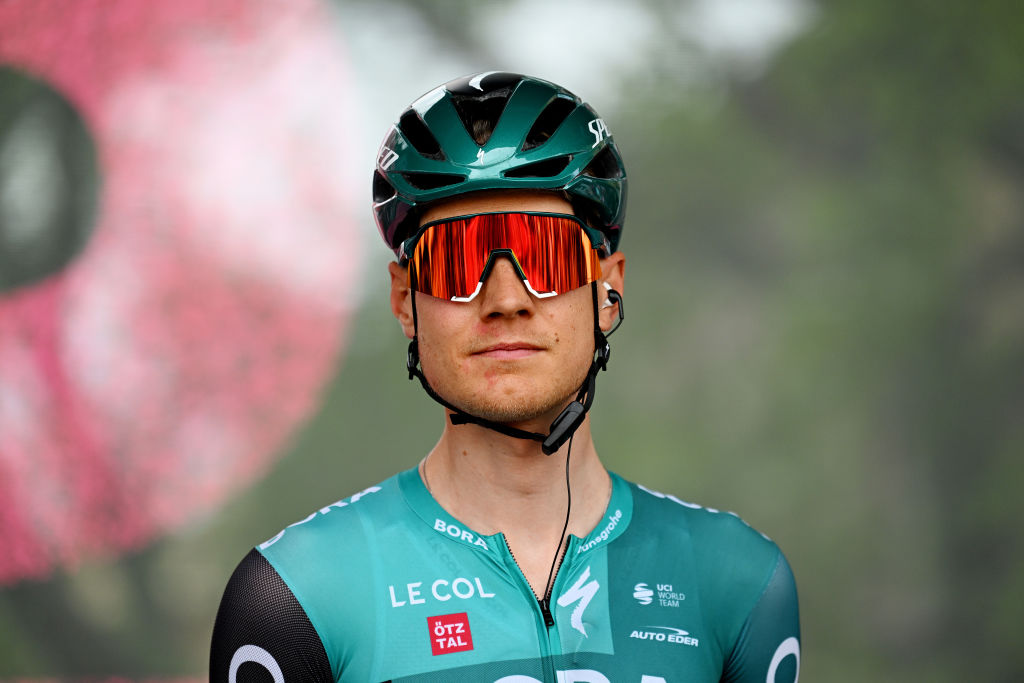Kelderman says disc brakes did not cause broken spokes on Giro d’Italia
Dutchman in supporting role after losing 11 minutes on Blockhaus

On the summit of the Blockhaus on Sunday, Wilco Kelderman’s frustration was palpable. His overall hopes at the Giro d’Italia had evaporated, and mechanical mishap was at least partially to blame.
A pair of broken spokes on the descent of the Passo Lanciano forced Kelderman into a most untimely bike change and a fraught pursuit of the pink jersey group. Once the road reared up again on the Blockhaus, he began to struggle. A deficit of metres quickly mushroomed into minutes.
After crossing the line almost 11 minutes down on the stage winner, his Bora-Hansgrohe teammate Jai Hindley, Kelderman told reporters that he believed his broken spokes had been caused by the heat generated by his disc brake rotors.
Predictably, both Specialized and Roval’s public relations teams scrambled to refute the theory, and at the start of stage 10 in Pescara on Tuesday, Kelderman walked it back. On mature recollection, he may have hit a bump in the road.
“After the race we looked also in details at what happened, actually, and maybe I hit a hole in the beginning of the stage,” Kelderman told Cyclingnews. “The wheel was not that strong, and that can happen in a race like that, and the roads in Italy are not always the best. But it was not about the disc or something like that.
“It was a super-fast descent, so then you think maybe it’s because of that. It was also super-hot and the disc also made a bit of noise, but that’s normal if you’re going so fast and you brake. But the discs are so well tested and they do so many controls on them, so it’s not possible that the spokes would break because of the discs. That’s not the problem.”
Whatever about the whys and wherefores of the broken spokes, the wheel change and subsequent chase effort certainly didn’t help Kelderman’s cause on the Blockhaus, where Ineos Grenadiers were setting a fearsome tempo on behalf of Richard Carapaz. Giulio Ciccone (Trek-Segafredo) and Simon Yates (Team BikeExchange-Jayco) were among the notable contenders quickly caught up in the winnowing process, and Kelderman would soon follow them out the rear of the front group.
Get The Leadout Newsletter
The latest race content, interviews, features, reviews and expert buying guides, direct to your inbox!
“It was a super-fast descent and I just rode down like normal, but then two spokes broke and I needed to change bikes for that,” Kelderman said. “It was a shit moment actually, especially on a fast descent where it went full gas into the final. I didn’t really have time to breathe and come back so it was not really nice.”
Kelderman’s Giro preparation was tempered by a heavy crash and concussion at Liège-Bastogne-Liège, and he acknowledged that, even without the wheel change, he was unlikely to have featured in the front group of six that contested the stage win on the Blockhaus.
“I wouldn’t have been with the best, for sure not, because my preparation wasn’t the best and I didn’t have the confidence to be with the best,” Kelderman said. “But I could be up there maybe for the 10th place or something. It was just a shit moment, I didn’t have the power anymore to recover and go full on the climb.”
Kelderman, third overall two years ago, entered this Giro as part of a triumvirate of leaders with Hindley – his stable-mate at Sunweb on the 2020 race – and Emanuel Buchmann, but his role is now one of deluxe domestique. His current position – 23rd at 11:02 behind Juan Pedro López (Trek-Segafredo) – might grant him leeway to chase stage victory later in the race, but he downplayed the idea of re-entering the race for a top-10 place by gaining time in a fuga bidone.
“Jai and Emanuel showed they are up with the best and they can fight for the win or the podium,” Kelderman said. “Maybe I can for a stage win but mainly I will work with that.”

Barry Ryan was Head of Features at Cyclingnews. He has covered professional cycling since 2010, reporting from the Tour de France, Giro d’Italia and events from Argentina to Japan. His writing has appeared in The Independent, Procycling and Cycling Plus. He is the author of The Ascent: Sean Kelly, Stephen Roche and the Rise of Irish Cycling’s Golden Generation, published by Gill Books.